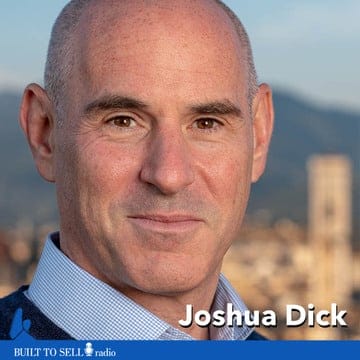About this episode
It’s ironic that Joshua Dick lives in Italy, one of the country’s worst hit by COVID-19 deaths. He moved to Italy with his family as a reward for selling his business, Urnex Brands. Urnex was in the unglamorous business of selling cleaning supplies for coffee makers. As is often the case, the least attractive companies are often some of the most profitable, and when Urnex ticked passed $5 million in EBITDA, Dick decided to sell.
To read a transcript of this episode, click here.
It’s ironic that Joshua Dick lives in Italy, one of the country’s worst hit by COVID-19 deaths. He moved to Italy with his family as a reward for selling his business, Urnex Brands. Urnex was in the unglamorous business of selling cleaning supplies for coffee makers. As is often the case, the least attractive companies are often some of the most profitable, and when Urnex ticked passed $5 million in EBITDA, Dick decided to sell.
This episode is full of great wisdom for business owners right now:
The “molt” is on: Dick, who is also the author of the book “Grow Like A Lobster” uses the analogy of a lobster’s lifecycle as a way to describe a business’s evolution. Its hard shell protects a lobster, but once it grows to a specific size, it must shed its shell and develop a new, larger protective layer. During this “molting” process, it lays itself vulnerable on the ocean floor while a new hard protective layer forms. Many owners feel unprotected right now, which is why — just like the lobster — now is the time to retool and build a more durable business.
Focus: when Dick took over the family business, there were seven unique product lines, and he decided to jettison six of them to become the world’s most significant supplier of cleaning materials for coffee makers. That gave him Monopoly Control allowing him to beef up margins and grow more quickly.
The secret to selling is not having to: Dick loved his company and employees, so he knew that for him to sell, he would need to be offered a double-digit multiple of EBITDA. Being willing to walk away gives you the ultimate poker hand.
Market to your customer’s goal. Instead of saying, “we have better cleaning supplies,” Dick marketed his cleaning supplies as enabling them to make their customers happy, by making better tasting coffee — not more sanitary machines—a subtle, but an essential twist.
There are several key takeaways from this interview, including:
- How to gracefully manage the transition of a family business
- How to structure your business so that it’s not dependent on you
- Why hitting $5 million in EBITDA opens up a new world of possibilities
- How to avoid customer concentration
- How to structure a phantom equity program
- How to pick your M&A professional
- A definition of reps and warranties insurance
When Dick’s business crested $5 million in EBITDA, it triggered him to reflect on what a significant portion of his wealth was tied up in his company. What’s driving your decision to sell now? If it’s just the desire to escape the market turmoil and you haven’t got a clear picture of why you’re selling, you may end up regretting your decision to exit. To find out if you’re personally ready to exit your business, complete your PREScore™ now.
Check out our article on How Selling Less Made Apple Worth More.

About Our Guest
Over fifteen years, Joshua Dick transformed a small family business into a
global market leader in the coffee industry with customers in over 70 countries
and distribution facilities on three continents, like Starbucks and Keurig. In
the process, sales grew more than 25 times while earnings multiplied over
275 times. After the sale of the business, Joshua started a new adventure
by moving to Florence, Italy with his wife and three daughters. He has now
dedicated himself to helping others who seek to build extraordinary businesses
based on what they truly love to do.


